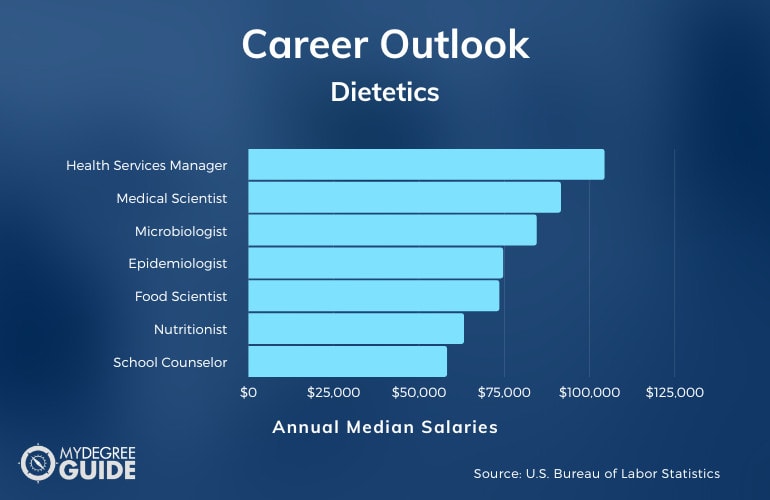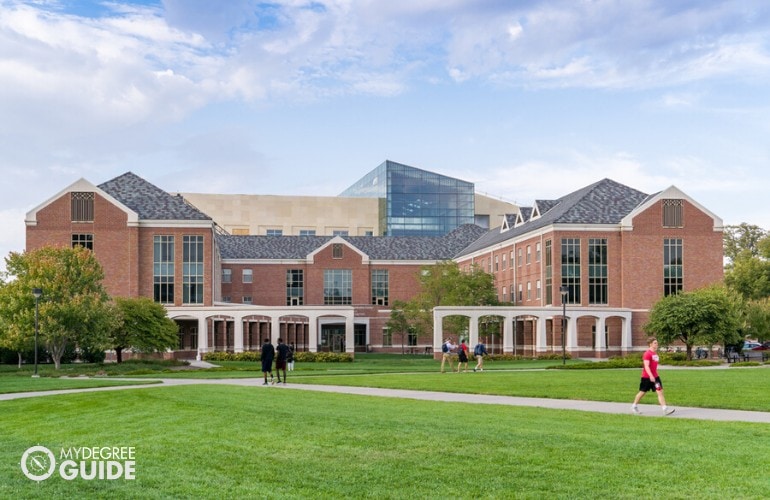Getting your online dietetics degree can open up new doors and jumpstart your career path.

The link between healthy eating and a fulfilled lifestyle is well understood, and plenty of people want to learn how to enhance their lives through food choices.
Editorial Listing ShortCode:
Dietitian degrees can allow you to work with the public and create real change.
Universities Offering Online Dietetics Bachelor’s Degree Programs
Methodology: The following school list is in alphabetical order. To be included, a college or university must be regionally accredited and offer degree programs online or in a hybrid format.
1. Arizona State University
Getting its start in public education in 1886, before Arizona was a state, Arizona State University is a pioneer of global pedagogy. Using research as part of the curriculum, students have a complete collection of undergraduate degrees to choose form.
Its graduate and doctoral degrees entice students to go beyond their expectations to solve challenges that plague the world.
- BS in Nutrition
Arizona State University is accredited by the Higher Learning Committee of the North Central Association of Schools and Colleges.
2. Benedictine University
Offering more than a private education since 1887, Benedictine University stresses the importance of good citizenship, positive change, and diversity to each of its undergraduate, graduate, or doctoral students.
With students from every state and a number of other countries, BU understands the need for flexibility in an educational system.
- BS in Nutrition and Dietetics
Benedictine University is regionally accredited by the Higher Learning Commission of the North Central Association of Colleges and Schools.
3. California State University
Change has been a part of the California State University since it was conceived in 1857. Over time it has become an immense public university in the nation. Having over 1,800-degree routes in 240 specialties, CSU awards an excess of 100,000 bachelorettes, Master’s, and doctoral degrees yearly to students globally.
- BS in Nutritional Science
Cal State LA is accredited by the WASC Senior College and University Commission.
4. Eastern Michigan University
- BS in Dietetics
Eastern Michigan University is accredited by the Higher Learning Commission.
5. Kansas State University
Kanas State University opened in 1863 to give residents of Kanas and beyond access to public higher education.
Getting a bachelor’s degree in K-State can help open doors to career options in countless fields, but obtaining a graduate or doctoral degree allows students who are looking to use investigation studies and technology to advance personally and professionally.
- BS in Dietetics
Kansas State University is accredited by the Higher Learning Commission of the North Central Association of Colleges and Schools.
6. Marshall University
Named in 1837 for the fourth Chief Justice, John Marshall, Marshall University is a celebrated public collegiate school in WV. MU is home to one of the cancer research centers in the region, a renowned medical center, and an astounding school of education.
Marshal University’s degree programs feature undergraduate, graduate, and doctoral opportunities in various fields.
- BS in Dietetics (on Campus)
Marshall University is accredited by the Higher Learning Commission of the North Central Association of Colleges and Schools.
7. Rutgers University
Among three campuses across NJ, Rutgers University is celebrated as a school that provides affordable public education to students looking to gain an undergraduate or graduate degree.
Making an impact on its community since 1766, RU takes pride in its groundbreaking discoveries and community care programs. Rutgers excels in programs such as medical, education, and social sciences.
- BS in Nutrition and Dietetics
Rutgers is accredited by the Middle States Commission on Higher Education.
8. SUNY Oneonta
As a staple of New York’s History since 1889, SUNY Oneonta brings educational outreach programs to students beginning in elementary school and helps continue that education by offering affordable public college degree programs. There are sixty undergraduate programs and a number of graduate programs that help students reach their full potential.
- BS in Dietetics
SUNY Oneonta is accredited by the Middle States Association of Colleges and Secondary Schools.
9. Texas Woman’s University
1901 was the beginning of an exceptional era for Texas Woman’s University. This small public school developed into a powerhouse of educational opportunity over the years, becoming a co-educational institution in 1994. TWU grants BA, BS, MA, and DR degrees in a broad range of disciplines, through face-to-face and web-based classes.
- BS in Nutrition
Texas Woman’s University is accredited by the Southern Association of Colleges and Schools Commission on Colleges.
10. University of Alabama
The University of Alabama has stood out for its academic excellence and comradely since 1820. Students looking for degree programs to contribute to their individual and vocational goals seek one of the many undergraduate, graduate, or doctorate degrees offered through UofA. Law students turn towards Alabama as a leader in justice education.
- BS in Food and Nutrition
The University of Alabama is accredited by the Southern Association of Colleges and Schools Commission on Colleges.
11. University of Alaska – Anchorage
Created in 1954, The University of Alaska – Anchorage serves a large portion of Alaska’s adult educational needs by providing a means of acquiring an undergraduate or graduate collegiate degree. This public educational system has about 18,000 students a year that is divided throughout its five main campuses and distance learning courses.
- BS in Dietetics
The University of Alaska – Anchorage is accredited by the Northwest Commission on Colleges and Universities.
12. University of Arizona
NASA has been known to turn to students and faculty members of the University of Arizona to assist in research and discovery. This is because the University of Arizona has provided top of the line academia since 1885, recognized as one of the best in the country by U.S. News & World Report. It has all sections of education degrees that start with a bachelor’s and expanse to a doctorate level.
- BS in Nutritional Sciences
The University of Arizona is accredited by the Higher Learning Commission.
13. University of Northern Colorado
With its own student newspaper and radio station, the University of Northern Colorado has a strong history of showcasing student achievements and historical collections.
Becoming a part of the public educational system in 1889, Northern Colorado encourages learners to gain an undergraduate or graduate degree in a major that cultivates their imagination.
- BS in Dietetics
The University of Northern Colorado is accredited by the Higher Learning Commission.
14. Weber State University
Weber State University opened as an educational organization for the Mormon Church in 1889 but became a public university in 1933. WSU has upwards of one-hundred programs of study that allow students to achieve an associate, BA, or BS.
For students looking to take their education a step further, Weber University has multiple graduate programs to choose from.
- BS in Nutrition Education
Weber State is accredited by the Northwest Commission on Colleges and Universities.
Online Dietetics Degrees

People who work in the field of dietetics have a powerful and fulfilling link to the public and are able to prompt real and meaningful change through diet and lifestyle changes.
There are plenty of directions that you can go and you can even get your master’s degree in dietetics and work in a managerial or consulting capacity.
Many people who get this type of degree prefer to work in community health, establishing plans for local or regional geographical groups to obtain better health through access and education.
Alternatively, you can work one-on-one with private individuals who may have unhealthy relationships with food or food-related illnesses that can be helped with a healthy diet and lifestyle.

If you have an analytical mind as well as a love for nutrition, you could become a food scientist and aid people in learning about nutrition on a macro level.
Those who work in an advisory or scientific capacity generally need a lot more schooling and must rise up through the ranks. Jobs in food science can be lucrative, and there is usually a high demand for qualified candidates.
This career path can be perfect for those who love to work with people and those that have diplomatic and interpersonal skills to inspire others.
If you want to pursue this career path, you should be relatively thick-skinned, able to communicate effectively, and have an interest in the basics of food science and how the human body works to metabolize different ingredients.
Dietetics Curriculum & Courses

Although every school is different, there are some standard courses that dietetics degrees typically include. The following is a list of what you can reasonably expect from your curriculum.
Of course, you will have the option to take electives and fine-tune your educational preferences as well.
- An Overview Of Public Health Concerns – This course gives a breakdown of the hot-button health issues of the day and how to address them. It is designed to offer a macro-level understanding of how health affects the population.
- Nutrition and Lifecycle – As we age, our bodies require different types of nutrition and lifestyle changes. This course provides information on what humans need at varying times in their lives.
- Biochemistry – It’s essential to understand how food interacts with the body, and this course provides an overview of the science behind how our bodies work.
- History of The Human Diet – How we eat has evolved over the years. This course looks at how nutrition impacted our quality of life and what we can learn from our ancestors.
- Nutrition Assessment – This course deals with how to can quantify the nutritional success or failure of a group of people. It can provide great research tools for future studies.
- Sports Medicine and Nutrition – Athletes need a specific diet to operate at peak performance, and this course provides an understanding of how to create and tailor nutritional plans for elite athletes.
- Understanding Food Intolerances – Food intolerances or allergies are a part of life, and more prevalent in some parts of the world than others. Understanding how to identify and deal with them is a crucial aspect of dietetics.
- Community Nutrition – This course looks at the dynamics of a group or community and establishes how to create a nutritional plan to suit their needs.
- Cellular Nutrition – Nutrition impacts our bodies on a cellular level, as this course illustrates by breaking down the relationship of our body to the food we consume.
- Clinical Care – This course allows students to understand how to create personalized nutritional plans for different types of patients.
If these classes sound interesting to you, you might be a good candidate for a degree in dietetics.
Dietetics Careers & Salaries

There are plenty of different ways that you can use your degree in dietetics.
Those who decide to get more schooling can advance to more elite positions in the field, but even entry-level or fresh graduates can generally find fulfilling work.
Many people start off working nutrition or under the wing of other dieticians. In order to get your feet wet, you need to get your degree and finish a 1,200-hour internship.
The internship is designed to allow you to gain real-world experience, and give you a chance to see if this career path is right for you.
Dietetics is a popular major choice because there is so much that you can do with your degree, and many of the higher-level positions are quite lucrative.

According to the U.S. Bureau of Labor Statistics, these are ballpark salaries for some typical jobs in this field. Of course, salaries will vary depending on your job market and experience, but this should give you a starting point.
| Careers | Annual Median Salaries |
| Health Services Manager | $104,280 |
| Medical Scientist | $91,510 |
| Microbiologist | $84,400 |
| Epidemiologist | $74,560 |
| Food Scientist | $73,450 |
| Nutritionist | $63,090 |
| School Counselor | $58,120 |
| Social Worker | $51,760 |
| Eating Disorder Counselor | $47,660 |
| Community Health Worker | $42,000 |
Your degree in dietetics can open up so many doors for you in terms of a lucrative and fulfilling career path.
Dietetics Degree Specializations & Concentrations

While getting your degree in dietetics, you can fine-tune your major to focus on one or two key areas. If you choose to do this, it’s essential to think about what kind of job you want to get upon graduation.
Although there are plenty of different paths to choose from, these are some of the most common concentrations for those who study dietetics.
- Dietetics – Concentrating entirely on the study of dietetics can set you up for a career as an RDN, or Registered Dietician. This concentration is primarily focused on disease treatment and prevention and the use of nutrition to solve chronic problems.
- Food and Nutrition – This concentration can set you up for a lucrative and rewarding career in food science. Students in this concentration learn about food preparation, quality standards, and how to shape our food culture on a macro level.
- Nutrition and Health – This is one of the most popular concentrations in dietetics. Those who concentrate their efforts on nutrition and health develop one-on-one treatments for individual patients with chronic illnesses. It can help give you a chance to work with the public on real solutions.
- Nutritional Sciences – This concentration can be splintered off into other specialties and is an umbrella term for the wellness, exercise, and nutritional industries. If you are interested in working with communities on overall health, this could be the concentration for you.
You can take your dietetics degree in virtually any direction that you would like. This list is just one jumping-off point, but you can create your own plan easily.
Choosing a Dietetics Degree

There are plenty of places where you can get your dietetics degree online, but before you make your choice, you will want to consider a few key points.
Think about how many resources your school offers. There are plenty of perks to joining up with different types of schools, including networking opportunities and flexible class schedules.
If you are an adult learner, you may need a little bit of leeway when it comes to taking your classes. Don’t be afraid to ask questions and know what you will and will not compromise on.
Credibility is another critical factor when it comes to picking the right school. You want your degree to make employers take notice, so choose a school that carries some clout with it. There are a few ways that you can assess credibility, such as to look at how long the school has been operational and talk to other alumni.
If you want to get an advanced degree, look at if other schools accept credits from the online college of your choice and see if there are hidden costs to tuition.
By covering all of your bases, you can be confident in your decision and feel better about your education overall.
Accreditation for Online Nutrition Degrees

Regional accreditation is one of the most crucial things you should look for when choosing a school for an online bachelor’s in nutrition or even an online master’s in nutrition. Accreditation gives the school credibility and shows potential employers that you have been given the education necessary to do a number of different jobs.
Accreditation is essentially a stamp of approval from governing bodies that says that your school is providing quality education and knows what they are doing.
For your dietetics degree, you will want to ensure that the Accreditation Council for Education regionally accredits your school of choice in Nutrition and Dietetics or ACEND. This influential and acclaimed body only puts its name on the best schools, and their endorsement carries a lot of weight.
You can check to see if your school is accredited, and by whom, by simply checking their website. They will have a link to their accrediting body right online. If you can’t find information online, don’t hesitate to call the school itself to check.
Regional accreditation should be one of the primary factors that you consider when choosing a school. Make sure that you take it seriously because regional accreditation could spell the difference between you getting the job of your dreams or not.
Dietetics Licensing and Certification

Once you get your degree in dietetics, you can work in a number of different fields. We explained a few options earlier in this article, but we have gone into a little bit more detail here. These jobs are jobs you can get with a dietetics degree and certification.
- Registered Dietitian (RD) – This popular job deals with the science of nutrition and how your diet affects your overall health and wellbeing. Professionals in this concentration can help treat and diagnose nutritional ailments and provide solutions to common problems.
- Certified Clinical Nutritionist (CCN) – This job explores the link between nutritional needs and our wellness and mental wellbeing, as well as prescribes treatments to aid in cognitive function and health.
- Certified Nutrition Specialist (CNS) – This career path involves implementing public health initiatives on a macro level and affecting social change through healthier eating and habits. It’s a highly sought-after job that generally requires additional schooling and networking.
There are plenty of paths that you can take once you get your degree in dietetics.
Financial Aid & Scholarships

College can be expensive, but fortunately, there are plenty of opportunities for you to get financial aid from federal, state, and collegiate levels.
It’s essential to explore all of your options before committing to a program. They can help ease your financial burden and help you keep a good school and life balance, especially if you are an adult learner.
The federal government offers plenty of student aid through the U.S. Department of Education. Apply for grants and loans online.
You may also be able to participate in work-study programs that allow you to shave a little bit off your tuition costs while you are attending school. Similarly, you can get scholarships and grants through your individual state.
Unlike loans, scholarships, and grants don’t need to be paid back. They are in high demand, so you will need to apply for them early in order to be considered. Make sure that you apply for a number of different grants and scholarships.
Colleges and private foundations also offer aid. To find out all of your options, research the college of your choice and see what’s available.

Can You Get a Dietetics Degree Online?
You can undoubtedly get your dietetics degree online. Get your bachelor’s master’s or certificate right from the comfort of your own home.
As an added benefit, online courses are generally much more flexible and offer a number of different learning options so that you can get your degree on your own time.
Where Can I Do a Degree in Dietetics?
You have a few options when it comes to getting your degree in dietetics. You can do it in the traditional way where you physically go to a brick and mortar university, or you can get it online.
Some students prefer to do a mixture of both. It’s really up to your learning style and preferences.
How Do I Become an Online RDN?

To become an online RDN, you need to take online classes and get a credential from the Accreditation Council for Education in Nutrition and Dietetics.
You may have to complete an internship as well.
Is Dietician a Good Career?
Yes, a dietician is considered a good career for many professionals. Healthcare jobs are projected to grow 15% for the next ten years, according to the Bureau of Labor Statistics, much faster than the average for all occupations. Careers in this field include eating disorder counselor, nutritionist, school counselor, food scientist, and health services manager.
Being a dietician is an excellent career for a number of different reasons, precisely because it is always in such high demand.
There’s also a lot of room for growth in this career field, and many people find the work to be exceptionally rewarding.
Are There Any Didactic Programs in Dietetics Online?
Yes, there are specifically didactic programs that you can take online.
Plenty of schools offer this concentration, and you can complete your entire coursework on the internet.
Where Can I Find a Job With My Dietitian Degree?

Depending on your concentration and what kind of degree you get, there are many job opportunities. Even most entry-level candidates find that they can get work in nutritional fields and consulting.
Those with higher-level degrees may be able to work on larger scale community initiatives or management.
Are There Affordable Dietitian Degree Online Programs?
All colleges with nutrition majors vary in price, but you can certainly find affordable options online if you look for them. You can also offset your educational bills with loans, scholarships, and grants.
Check with your preferred institution to see what you can do to make tuition costs a little bit more palatable.
Are There Differences Between a Dietician and a Nutritionist?

There is one primary difference between the two disciplines – a dietician is held to slightly higher standards than a nutritionist is.
Some people think that there is a little bit more science involved when it comes to working as a dietician.
Is a Master’s Online Dietitian Degree Required to be an RD?
It’s not required, but it can be recommended depending on how competitive your market is. It’s never a bad idea to have your master’s degree, and the additional education can help give you a leg up on the competition.
Is it Worth It to Get a Bachelor Degree in Nutrition and Dietetics Online?
Yes, getting a bachelor degree in nutrition and dietetics online is worth it for many students. The Bureau of Labor Statistics is projecting 15% job growth in healthcare occupations over the next 10 years. Common careers in this field include community health worker, dietitian, nutritionist, social worker, food scientist, and health services manager.
Most people feel that it’s worth it to get their degree online because there are so many different things that you can do with it.
Even entry-level positions usually pay more than average, and there is plenty of room for advancement for those who are committed to the work.
What Courses Will I Take For a Didactic Program in Dietetics (DPD)?
Most students take plenty of courses in biology and some in psychology for their didactic degrees, although all schools vary in what they have to offer.
Getting Your Dietetics Degree Online

Dietetics is a growing field with plenty of great opportunities. Getting your degree in this field is a good way to get ahead in your life and really enhance your earning potential.
These days, it’s easier than ever to get your degree right online, and plenty of people are finding that they have rewarding and lucrative careers after finishing their online schooling.
It’s easier than ever to take the plunge. All you need to do is make the decision to get started and start looking for the school that is right for you.
Why not apply today and start a brand new chapter in your life?
